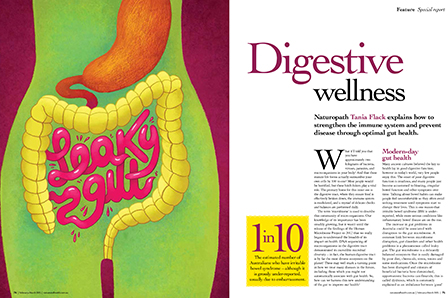Home / Nutrition Program / Basics / Leaky Gut
 As part of our screening prior to your detox we may recommend a Comprehensive Stool and Digestive Analysis (CDSA) and/or an Intestinal Permeability urine test, which provides important information about the state of your gut and the potential for a condition called ‘Leaky Gut’.
As part of our screening prior to your detox we may recommend a Comprehensive Stool and Digestive Analysis (CDSA) and/or an Intestinal Permeability urine test, which provides important information about the state of your gut and the potential for a condition called ‘Leaky Gut’.
The gut is one of our most important organs of elimination and needs to be working effectively. If leaky gut is indicated in your initial screening we will prescribe treatment accordingly. It is important that we incorporate this into your detox program for best results. If the gut isn’t working well everything else in the body is affected.
Leaky gut is a poorly recognised but extremely common problem. It is a condition where the lining of the intestines becomes hyper-permeable due to low grade inflammation. This is can be caused by poor diet, alcohol, caffeine, medications, stress and most importantly ‘dysbiosis’ or an overgrowth or imbalance of normal bacteria in the digestive tract. Dysbiosis is the most common sources of endogenous toxins in the body.
In leaky gut, the tiny pores between the cells of the gut wall enlarge in response to low-grade inflammation, letting particles of undigested food, toxins and bacteria into the system. The body recognises these particles as foreign and launches an immune response, which causes low grade inflammation and the production of antibodies against what was once harmless foods. The damaged gut is then also less able to produce secretions and enzymes that are essential for healthy digestion and the absorption of nutrients.
Leaky-gut is not a disease itself but is thought to play a role in many other diseases.
1. When the gut is inflamed, it can’t absorb nutrients and foods properly so fatigue and bloating can occur
2. When larger than normal food particles are absorbed the body launches an immune response = allergies and inflammation
3. When the gut is inflamed the carrier proteins are damaged so nutrient deficiencies can occur
4. Detoxification pathways become compromised, burdening the liver and other organs = chemical sensitivities
5. Protective IgA and immune response becomes unable to ward off protozoa, bacteria, viruses and yeasts
6. Bacteria and other harmful organisms can pass into the system and potentially cause problems in other areas of the body
7. The worst outcome is the formation of antibodies, that can look similar to our own tissue, which causes the body to then launch an immune attack against itself – this is probably how autoimmune diseases start

When we react to a stressful situation we trigger our ‘fight or flight’ response, which sends a cascade of chemical messengers around the body to enable us to fight off or runaway from danger. In today’s modern world our stressful situations rarely need us to do this, but still the body responds in the same way it always has.
One feature of this response is to send all available blood flow and nutrients away from the GIT out to the arms, legs and heart to help us defend ourselves. In the case of chronic stress we undermine the gut lining by way of this diminished delivery of blood flow, oxygen and nutrients. This is why stress is an important contributing factor to Leaky Gut.
Most of immune system is based around the digestive tract, acting like our own internal ‘border control’ protecting us against foreign invaders. Leaky Gut can affect our ability to launch an appropriate immune response. Particles of under-digested foods, bacteria and toxins can cross into the system where the body may form antibodies witch causes inflammation and a massive immune response. Not only does Leaky Gut Syndrome predispose you to a weakened immune system, allergies and sensitivities, it is thought to be a major contributing factor to autoimmune disease.
The liver is one of the body’s most important organs of elimination; it works to rid the body of toxins, excess hormones and other wastes. Leaky gut can put the liver under great strain because it enables wastes to be reabsorbed back into the system where they cause oxidative stress and further inflammation. This process is known as ‘entero-hepatic recycling’. This eventually overloads the liver’s detoxification processes and we can start to feel unwell and become much more sensitive to the world around us. This is why it is so important to understand how the gut is functioning before starting to work on the liver. Stimulating the liver first when someone has a leaky gut will just make them feel worse as it speeds up entero-hepatic recycling and oxidative stress in the body. So this is why we start with gut and follow a systematic approach to achieve the best results with the least amount of disruption.
 Read my article on Leaky Gut and Digestive Health
Read my article on Leaky Gut and Digestive Health